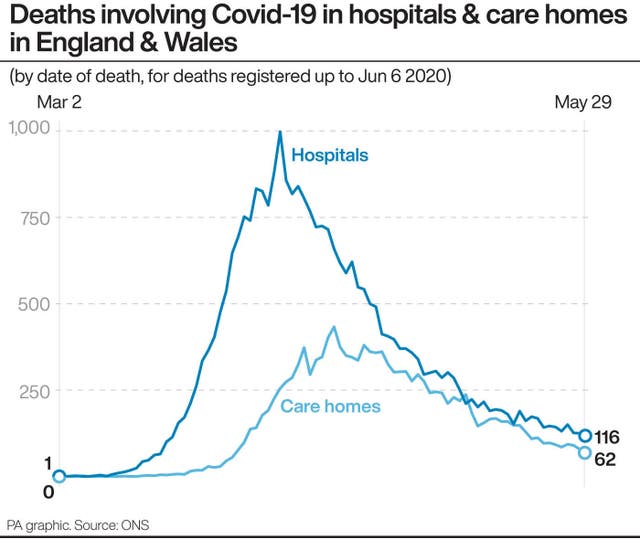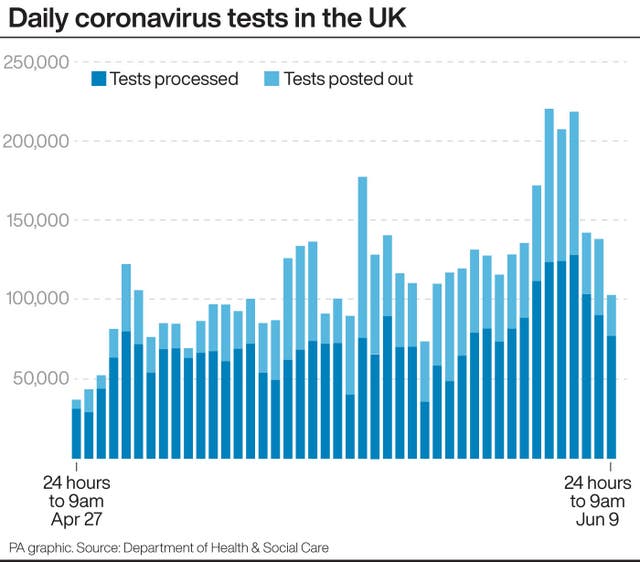Shops to reopen from Monday in England but primary schools plan shelved
Non-essential shops will be allowed to open if they follow strict rules to limit the spread of coronavirus.

Shops in England will be allowed to reopen from Monday, the Government announced, just hours after scrapping plans to get more primary school children back in class before September.
Business Secretary Alok Sharma confirmed plans for non-essential shops to open their doors as the Government continued efforts to repair the economic damage caused by the coronavirus pandemic.
His announcement at a Downing Street press conference came after Education Secretary Gavin Williamson abandoned plans for all primary pupils in England to attend classes before the summer break.
Shops will only be able to open their doors if they have completed a Covid-19 risk assessment and can implement social distancing measures.
But other businesses, including pubs, restaurants and hairdressers, will remain shut until July 4 at the earliest, Mr Sharma said.
The Business Secretary said shops would be allowed to reopen as long as they comply with the “Covid-secure” guidelines.
“This is the latest step in the careful restarting of our economy and will enable high streets up and down the country to spring back to life,” he said.
Enforcement notices can be issued if shops reopen without following the guidance, he added.
Many businesses have warned that the rule requiring people to stay two metres apart would jeopardise their ability to reopen.
Mr Sharma said it was being kept under review and “when it is safe to do so, we will see whether you can move to a shorter distance”.
He added: “We are taking a cautious view on this. I completely understand why for economic reasons businesses will want to have a look at this two-metre rule.”
In other developments:
– The latest figures from the Office for National Statistics (ONS) show that less than a fifth of deaths registered in the week ending May 29 in England and Wales involved coronavirus – the lowest proportion since the week lockdown was imposed.
– But there have been more than 63,500 excess deaths in the UK since the outbreak began and analysis by the PA news agency showed the number of fatalities involving Covid-19 in the UK is now just under 52,000.
– Care minister Helen Whately has become embroiled in a row after apparently saying that policies blamed for the high rate of Covid-19 deaths in care homes were based on scientific advice.
– Leading economists have warned ministers that they predict “really high unemployment for the foreseeable future” as a result of the pandemic.
– More than one million businesses have applied for a Government-backed loan to help them get through the economic destruction caused by the pandemic.

– People in Wales have been advised to wear face coverings when using public transport but it will mot be mandatory.
– Nicola Sturgeon announced an expert group is to be established to study the effects of Covid-19 on minority ethnic communities in Scotland.
Just an hour before Mr Sharma’s announcement on shops, Mr WIlliamson admitted defeat over plans – set out in the Government’s coronavirus recovery plan – for primary schools to fully reopen.
Children in nursery, Reception, Year 1 and Year 6 in England began returning to primary school last week after the Government eased lockdown measures.
But some schools said they did not have enough space on site to admit all pupils in the eligible year groups, while adhering to Government guidance to limit class sizes to 15 and encourage fewer interactions.
Mr Williamson said the Government would like to see schools who “have the capacity” bring back more pupils where possible before the summer break.
He told MPs in the House of Commons that the Government was still working towards bringing all children back to school by September, and he said exams will go ahead next year.
Figures released by the Department for Education (DfE) on Tuesday showed that just over half (52%) of primary schools in England had reopened to more children on Thursday last week.

But addressing MPs, Mr Williamson said the number of schools that have begun reopening their doors to more pupils has risen in recent days.
He said: “By the end of the week, more than half of primary schools were taking pupils from these year groups, and as of yesterday that had risen to over 70% of primaries that had responded.”
Paul Whiteman, general secretary of school leaders’ union NAHT, said there would have been “significant practical barriers” to bringing all primary pupils back in the summer term if the goal had gone ahead.
He said: “With the end of term just six weeks away, Government now needs to provide urgent clarity on the anticipated constraints that schools may face in September, so that schools and parents can start to look ahead and plan with greater understanding of the possible disruption that may yet still follow.”





